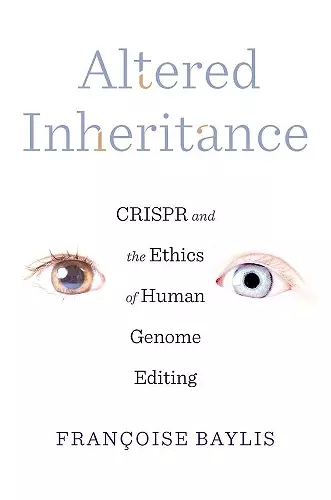Altered Inheritance
CRISPR and the Ethics of Human Genome Editing
Format:Hardback
Publisher:Harvard University Press
Published:27th Sep '19
Should be back in stock very soon

A leading bioethicist offers critical insights into the scientific, ethical, and political implications of human genome editing.
Designer babies, once found only in science fiction, have become a reality. We are entering a new era of human evolution with the advent of a technology called CRISPR, which allows scientists to modify our genes. Although CRISPR shows great promise for therapeutic use, it raises thorny ethical, legal, political, and societal concerns because it can be used to make permanent changes to future generations. What if changes intended for the good turn out to have unforeseen negative effects? What if the divide between the haves and have-nots widens as a result? Who decides whether we genetically modify human beings and, if so, how?
Françoise Baylis insists that we must all have a role in determining our future as a species. The scientists who develop and use genome-editing tools should not be the only ones making decisions about future uses of the technology. Such decisions must be the fruit of a broad societal consensus. Baylis argues that it is in our collective interest to assess and steer the development and implementation of biomedical technologies. Members of the public with different interests and diverse perspectives must be among the decision makers; only in this way can we ensure that societal concerns are taken into account and that responsible decisions are made. We must be engaged and informed, think critically, and raise our voices as we create our future together.
Sharp, rousing, timely, and thought-provoking, Altered Inheritance is essential reading. The future of humanity is in our hands.
An authoritative, comprehensive guide to the ethical issues around CRISPR, and her central message is clear: heritable human genome editing shouldn’t be treated as inevitable, and the decision to undertake it should be a collective one. She takes to task scientists who believe they need not answer for the societal consequences of their research and argues that we should adopt heritable genome editing only if it results in a more just and equitable world. -- Natalie de Souza * New York Review of Books *
A vivid call to action…Timely and important…Commitments to justice, responsibility, accountability, and consensus-building are features of a socially just science and bioethics. Toward this end, Altered Inheritance is a foundational tool in the path ahead. -- Adam Hayden * Science *
Exceptionally clear, insightful and well-argued…Baylis emphasizes that the science of genome editing cannot be separated from the social context in which it occurs…A timely and valuable book that enjoins us to seriously consider how CRISPR or other forms of genetic alteration could affect people who exist now and people who will exist in the years to come. -- Walter Glannon * Bioethics *
Insightful and forward-leaning. Françoise Baylis offers a wonderful framework to help us think about and act on bridging the divides between theory, science, politics, and practice. Her book Altered Inheritance will guide us toward more meaningful, sustainable solutions. -- Margaret Hamburg, Chair of the Board of the American Association for the Advancement of Science and 21st Commissioner of the US Food and Drug Administration
Altered Inheritance is a call to action. Fair, balanced, and enjoyably readable, this book provides us with insights into the greatest technical and social challenges of our day and their ethical impact on future generations. -- George Church, coauthor of Regenesis
Altered Inheritance argues that the use of gene-editing technology should require significant input from the broad public. This book is extremely timely, addresses a high interest and important topic, and comes from an influential voice in the gene-editing debate. -- Josephine Johnston, The Hastings Center
Informative and thoughtful, Altered Inheritance casts the ethically perplexing questions raised by genome editing in a clear new light. Françoise Baylis asks us to slow down and rediscover our collective moral agency instead of feeling overtaken by the momentum of science and technology. -- Peter Mills, Nuffield Council on Bioethics
Incisive and insightful, Altered Inheritance wrenches open the laboratory doors behind which science and technology struggle to set a new course for society, for humanity, and for those who are most vulnerable for extinction. -- Donna R. Walton, Founder and President, The Divas With Disabilities Project
Françoise Baylis is a fearless philosopher whose courage is matched by her talent. In this wise, lucid book, she asks exactly the right questions. What kind of world do we want to live in and how likely is gene editing to take us there? -- Carl Elliott, author of White Coat, Black Hat: Adventures on the Dark Side of Medicine
Baylis argues that everyone must have a role in determining our future as a species. Scientists who develop and use genome-editing tools shouldn’t be the only ones deciding on future uses of the technology. -- Allison Lawlor * Chronicle Herald *
Lays out the critical stakes with regard to editing the human genome with clarity, challenging several conventional approaches to the issue. -- Gina Maranto * Biopolitical Times *
An effort to demystify the science and ethics of this world-changing technology. -- Kat Eschner * University Affairs *
Baylis, a Canadian philosopher and bioethicist, provides some helpful description of the science behind gene editing but focuses primarily on the moral and public-policy issues it provokes. She aims to write an accessible book that will educate the public on this new technology and empower them to participate in coming debates about how to regulate it. -- David VanDrunen * Ordained Servant *
- Winner of PROSE Awards 2020 (United States)
ISBN: 9780674976719
Dimensions: 210mm x 140mm x 25mm
Weight: 447g
304 pages